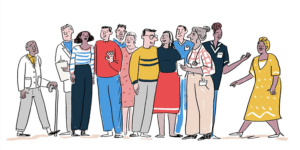NHS England (NHSE) describes health inequalities as unfair and avoidable differences in health across the population and between different groups within society. NHSE (2019) highlighted the need to respond to a widening gap around health inequalities in its Long Term Plan. It describes how integrated care systems (ICS) can address this gap in collaboration with local government and voluntary sectors. In 2021 they established the national Healthcare Inequalities Improvement Programme (HiQiP) which is responsible for setting the direction for tackling healthcare inequalities ensuring equitable access, excellent experience and optimal outcomes. Within HiQiP an approach to reducing healthcare inequalities known as Core20PLUS5 was launched. This has a focus on working with the 20% most deprived population and prioritising five key clinical areas.
Buckinghamshire, Oxfordshire and Berkshire West (BOB) Integrated Care Board (ICB) offered a small amount of funding for Primary Care Networks (PCNs) to deliver a one-year project addressing health inequalities, ideally in the CORE20PLUS5 category. Twelve PCNs with the highest levels of deprivation in BOB ICS were invited to complete a non-competitive expression of interest form with ten taking up the offer.
We undertook a rapid insight review over a year, completing it in May 2024. We interviewed managers, clinicians and project leads within ten PCNs across BOB to understand how the provision of small grants supported the reduction of health inequalities. We held three workshops with the PCNs to share learning. Three core enablers became clear:
- Funding – small funding can enable PCNs to explore where their efforts may be best served
- Co-design – this is paramount to explore realistic offerings between communities and healthcare providers
- Key skills and job roles – these must evolve to meet the needs of the ever-changing landscape both in communities and health providers
Feedback from PCNs included:
- “It may be a little pot of money, but it has given us as a team the opportunity to learn and improve our skillset whilst having a positive impact on patients” – GP Lead
- “Be flexible – what you have in your head doesn’t always translate when you are working with people” – PCN manager
- “Funding gives us headspace to think and time to fact find” – PCN manager
Download a copy of the full review here (pdf, link opens in new tab)
For further information please contact katie.lean@healthinnovationoxford.org

